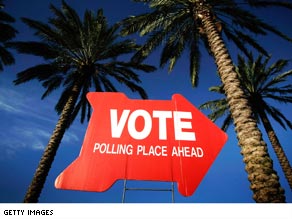 The voter registration deadline for the pivotal battleground state of Florida is coming up on Monday. But could the state’s anti-voter fraud law prevent thousands of Latinos and other prospective voters from having their ballots count?
The voter registration deadline for the pivotal battleground state of Florida is coming up on Monday. But could the state’s anti-voter fraud law prevent thousands of Latinos and other prospective voters from having their ballots count? The Voter Registration Verification Law was passed in 2006 and stipulates that voters must show proper ID matched against a federal database. If there’s no match then they can vote with a provisional ballot which becomes official only if they can prove their identity within 48 hours.
Floridian electoral officials said that the law is fair and will be enforced on Election Day. Yet several groups contend that the “no-match law” would create more problems than will be solved:
To demonstrate how easy it is to be tossed out by the new verification process, Tirso Moreno, a coordinator for the Farmworker Association of Florida, held up his driving license and social security card.
The social security card showed his formal name - including his mother's maiden name and father's last name - while the driving license was shortened to include only his father's last name.
"I don't think this electoral system has the ability to deal with the differences between the two cultures," said Moreno. It's a particular hardship for people whose first language is not English, he said.
Image- CNN
Sources- miamiherald.com, Los Angeles Times, Orlando Sentinel, South Florida Times, Guardian UK
1 comment:
I don't see that this a a Latino issue per se. This really just comes down to voting security, which has been an issue in numerous states - not just ones with high Latino populations. All US citizens with Floridian residence are registered in the system. If someone - Latino or otherwise - tries to vote in the presidential election and is not in fact a US citizen, then rejecting their vote isn't disenfranchisement, it's just enforcing the law.
Post a Comment